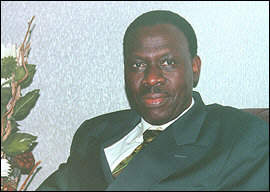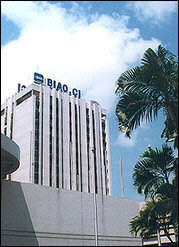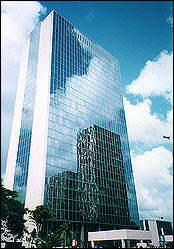 Maintain the growth rate around 6% Maintain the growth rate around 6% |
Following the devaluation of the CFA francs, the Government implemented a host of measures aimed at readjusting public finance. This should eventually lead to the computerization of the public spending system. In the purview of subregional economic intergration, every country should contain inflation rate to a level below 2%. In 1998, Inflation was under 2% and this is a remarkable feat " The Ivorian economy is an economy under the Structural Adjustment Program aimed at complete stabilisation of the economic fabric and resolutely focused on liberalisation and privatisation " notes N'Golo Coulibaly, Minister of Economy and Finance.

In the short term, the fundamental obstacle the country has to contend with is revitalising public finance and the issue of adopting and implementing corresponding management rules. Today, we need to let people know that nobody is above the law. General Guei pronouced an interesting statement on this subject. He said: The time of impunity is gone ", the Minister remarked.
At the level of the West African Economic and Monetary Union (UEMOA), there are stringent convergence criteria concerning the total pay roll. " By 2000-2002, the total pay roll must not be higher than 35% of budgeted resources. Presently, Côte stands at 40%.
Concerning the Ivorian debt, the Minister believes that Côte d'Ivoire will benefit from a higher level of debt reduction in the nearest future. This debt will be rescheduled with cancellations of about 90%. The country's philosophy remains committted to meeting its obligations. All commitments made on behalf of Côte d'Ivoire are viewed as commitments to be met ", hints the Minister. The country's foreign debt is valued at CFA F 9 0000 billion but the Government hopes to benefit from the debt reduction initiative in favour of heavily indebted countries. The debt reduction exercise will be in the form of grants to be awarded to our country and supported by programmes.
Côte d'Ivoire is poised to re-establish contacts with donor agencies especially the World Bank and the International Monetary Fund (IMF). In fact, the second batch dis- bursement slated for last March (CFA F 60 billion) in respect of Enhanced Structural Adjustment Facility (ESAF) is yet to materialise. An IMF mission visited Côte d'Ivoire from 1-8 Febraury to evaluate the efforts made so far by the new government in terms of revitalising public finance. An aggreement may be signed between the IMF and government before the end of the year.
Concerning the gains of privatisation, the Government collected CFA F 200 billion between 1991 and 1998 in respect of fifty companies sold over sixty companies earmarked for privatisation. " I am of the opinion that we should stop for a while analyse the situation and later distribute.Enough time for us to evaluate how the past privation exercise was conducted, what we gained from the exercise and its impact on the economy ", states Mr Coulibaly. In his views, the President of the Privatisation Committee, Jean-Claude Brou hinted that Côte d'Ivoire wil execute the sale of companies in accordance with its commitments vis à vis the donors. " We have anounced invitations to bid for SIR as well as for other companies, soon we will embark on the privatisation of SOTRA (Urban Transport Company) and others ", Brou explains. The rate of investment yielded in relation to GDP currently stands at 17% with more than half coming from the private sector.
UEMOA Countries resolved to attain a Customs union by January 2000. The result being that the harmonisation of customs duties at 20% for all the eight-member countries of the Union. The Customs produces 52% of Government's budget revenue representing between CFA F 582 billion and 640 billion per year. In order to combat fraud at customs, the Government decided to impose a monthly revenue quota to each customs checkpoint. As far as the Custom authorities are concerned, anti-fraud measures are necessary at atime when financial resources are rather scarce. However, the fall in revevue is attributable to other factors. The objective factors are the implementation of the UEMOA scheme whereby the the average taxation rate dropped from 53% in 1992 to 18% today. There is also the reduction of unique export duty on coffee and cocoa.
Concerning the fraud problem it is based on the fact that the government granted too generous exemptions in its bid to provide incentives. On the whole, these facilities granted have a negative impact on dwindling customs revenue. Presently, the big project of the Customs department is the computerisation of customs services in the interior since the services in Abidjan are already coomputerised.
In the area of the banking sector, the Caisse Autonome d'Amortissement (CAA) incorporated in 1959 is gradually becoming a public organisation bank. It plays the same role as commercial banks except that its clients are mainly public organisations ..

Concerning mainstream commercial banks , the
Société Générale de
Banque de Côte d'Ivoire (SGBCI) and the
Banque International pour le Commerce et l'Industrie
de Côte d'Ivoire (BICICI) are co-leaders
of the Ivorian market. The Banque
Internationale pour l'Afrique de l'Ouest (BIAO)
comes third. Moreover, BIAO was privatised and the
Belgian Bank, Belgolaise bought over the bank. According
to BIAO's Managing Director, Mensah
Kodjo, the bank has 18% of the ivorian market.
" We have 33 agencies in the major cities and
major agricultural distribution points of Côte
d'Ivoire ". The customers of BIAO is made up
of private individuals (60%) and enterprises (40%).
" Since three years, we diversified our activities
and financed the agro-allied industry ", hints
the BIAO MD. The bank has a network of correspondent
banks in the United States. " However, I consider
that the voume of business is not heavy enough.
This is a point on which to put more emphasis ",
says Mensah Kodjo. |
For now, Citibank Abidjan is the link beween American businessmen and the local market. This American capital bank often manages pension funds from the United States coming to the regional financial market (Regional Stock Exchange Market). However, Citibank remains an investment bank. The establishment of the Stock Brokerage Firm (SGI) operating actively on the Stock Exchange help to confer a certain popularity on the bank. SGI Citicorp, a subsidiary of Citibank offers among other things stock portfolio management as well as acting as custodian on behalf of its customers. Concerning SGI Hudson& Cie, It is an independent stock firm contrary to Citicorp which is part of Citibank. However, Hudson&Cie maintain regular correspondence with the International Stock brokerage firm through the transmission of regular statistical data to the financial market of UEMOA. Apart from this, it is working with a network of correspondents including Auebach-Grayson of New York, specialised in the operations of emerging markets. Concerning the financial market, Hudson&Cie believe that the taxation aspect often discourages company to get listed on the Stock Exchange. Meanwhile, the Regional Stock Exchange's yield stands at around 10% while profitability is much more higher. The regional financial market brings together all UEMOA countries and it has Stock Exchange branches in each country. These structures ensure the flow of information coming from the market to the players on the market and others. The Stock Exchange is headquartered in Côte d'Ivoire and quotation operations take place three times per week. The volume of transactions is about CFA F 100 million per operation for 38 companies listed on the stock market including only one non-Ivorian company. The quotation on the Exchange is effected electronically via satellite so that Stock brokerage companies in various countries could follow the operations in real time and intervene if necessary during the process of stock quotation. The medium term objective of the Regional Stock Exchange is to have 100 enterprises listed on it. The Regional Exchange is a private enterprise with a capital of CFA F 2.8 billion. Concerning the central depository-Settlements bank it has a capital of CFA F 1.2 billion. The Regional council for Savings and financial markets is public body of the Stock Exchange. Its duties include the formulation of strategies for mobilising savings in the subregion.
 Promotion of foreign investment Promotion of foreign investment |

In order to further attract private capital to Côte d'Ivoire, the Government established the Centre for Investment Promotion of Côte d'Ivoire (CEPICI). Under the supervision of the Prime Minister, CEPICI's mission is to promote investment by attracting foreign and domestic capital required for the economic development of the country. In 1997, CEPICI mobilised CFA F 266 billion worth of investments compared to CFA F 206 billion in 1998. This year, our objective is to have about CFA F 250 - 0 billion worth of investments ", hints CEPICI Director General, Akmel Prosper Akpa. The volume of private investments in Côte d'Ivoire is about CFA F 750 billion yearly. " The Government has great ambitions and great projects ", says CEPICI Director General.
In fact, within the purview of the 12 works of the Elephant of Africa, the Government need foreign capital. Either for the construction of the 3rd Abidjan bridge (Riviera-Marcory) or the extension of the North end Expressway up to Yamoussoukro (political capital) or even the Abidjan -Bassam Express way, foreign capital are awaited. Some works of the Elephant of Africa are yet to be awarded. They are: the Abidjan Olympic Stadium (100 000 seats), Ayama abattoir, Abidjan exhibition centre, Inter-urban coach park, Urban train park, Banco south bridge (all in Abidjan)and Bridge of Jacqueville. Works on the Abidjan Airport and those on Azito thermal station (Abidjan) are under way.
In order to make life easier for investors in Côte d'Ivoire, CEPICI initiated the One-stop shop, a place where all administrative formalities for incorporating companies are executed. Says the Director General of CEPICI , " These formalities range from the registration of company Statutes to tax assessment procedures for new companies ". In addition, every two years and since 1995 CEPICI organises a forum called 'Invest in Côte d'Ivoire'. The third edition of this forum tok place last November and pulled a crowd of 2 500 businessmen from all over the world including fifty American business tycoons. The 'Invest in Côte d'Ivoire' Forum is aimed at showing participants the various business opportunities which abound in this country. These opportunities are centered on reliable projects coupled with qualified and cost-effective manpower. The General Studies and Employment Promotion Agency (AGEPE) created in 1993 provide enterprises and business operators with statistics and studies relating to the employment market on a regular basis. This enable decision-makers and CEOs to make decisions in terms of employment and training policies. " There is a job-aid programme intended for young graduates to help them acquire experience ", says Germain Aké Yapo, AGEPE Director General. Also, this organisation is responsible for carrying out other programmes especially rural youth professional experience scheme, Special professional experience scheme for women and Special job-creation scheme. AGEPE also set up a data base for the employment market in Côte d'Ivoire. This data base serves as a guide for foreign investors in their choice of employees.
AGEPE often work in collaboration with the National Institute of Statistics, The Financial Data bank, Ecole Nationale Supérieure de Statistiques et d'Economie Appliquée (Advanced School of Statistics and Applied Economics) as well as other Non-Governmental Organisations. Meanwhile, supervisory and continuous education centres for executives and junior cadre officers are already working upstream. Thus, the Fonds pour le Développement de la Formation Professionelle [FDFP] ( Fund for the Development of Professional Training) is geared towards enabling officers already working improve their skills. However, enterprises have to contribute funds for the training of their staff. " Companies'contributions are deducted up front by the tax authorities ", hints Mr Monné the former President of FDFP Management Committee. He added that in the past contributions were paid to the National treasury and it was the responsibility of the treasury to allocate it for training. " Since a couple of years with the support of foreign assistance, we have been able to meet the needs of the less-privileged in society who are organised into Co-operative societies and associations so that the impact in terms of poverty alleviation would be felt in the remotest part of the country ", Monné explains.
Côte d'Ivoire also offers a lot of leisure and tourist attractions which are open to economic operators after a day's work or during the weekend. |

